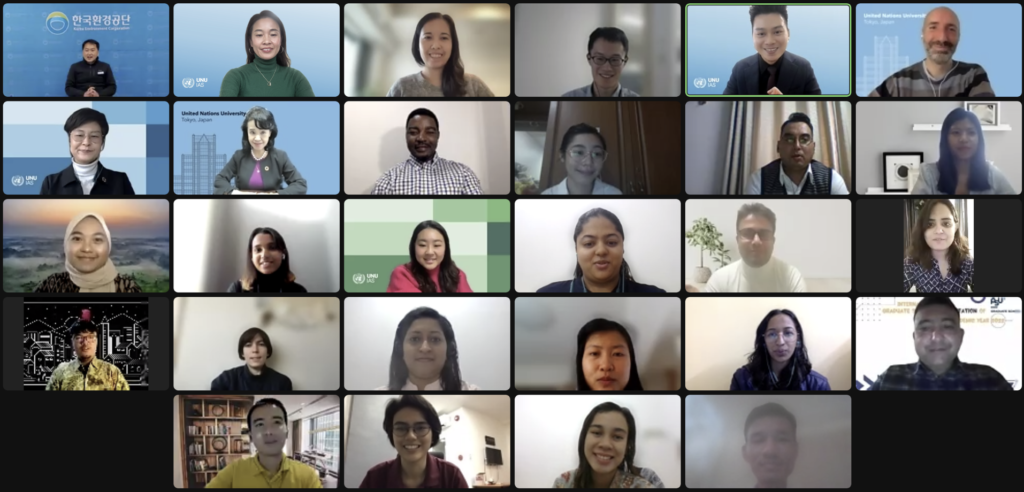 Highlights:
Highlights:
- Twenty-one participants from 10 countries across the Asia-Pacific region participated in the 2022 ProSPER.Net Leadership Programme on shifting to net zero.
- Throughout the programme, participants attended online lectures and workshops, built climate leadership skills, and learned about strategies towards achieving a decarbonised economy.
- Groups designed net-zero transition strategies that could be implemented in a city or community, focusing on solutions which incorporated urban design, reducing food waste, addressing air pollution, and transport sector initiatives.
The 2022 ProSPER.Net Leadership Programme (LP) was held from 5th – 8th and 16th December, 2022 online, hosted by UNU-IAS, supported by Ministry of the Environment, Japan and Korea Environment Corporation. Under the theme of ‘Shifting to Net Zero: Implementation strategies for net-zero transitions’, 21 participants joined for the 5-day programme to learn about strategies towards achieving a decarbonised economy.
Participants came from a variety of sectors, and included young professionals and emerging leaders in academia, the public sector, the business community, and civil society, coming together to build climate leadership skills necessary for net zero implementation.
Providing opening remarks, Shinobu Yume Yamaguchi (Director, UNU-IAS) stressed the importance of strengthening synergies in order to implement the Paris Agreement on climate change, followed by highlighting UNU-IAS’ commitment to empowering emerging leaders through education and capacity building to develop future leaders to work at the forefront of implementing the global agenda. She ended her remarks thanking all participants and lecturers, and expressed her appreciation to the Ministry of the Environment, Japan for their continuous support for ProSPER.Net. Welcoming remarks from Seung Hoon Lee (General Manager, International Cooperation Division, Department of Global Cooperation, Korea Environment Corporation), identified youths’ role in implementing net zero, noting their abilities as critical thinkers, changemakers, innovators, and communicators. Empowered with knowledge, and equipped with leadership, he stressed that youth can drive change in their communities and countries as leaders.
Chairing the first day’s session was Jerome Silla (Research Associate, UNU-IAS), who explained the LP’s focus on incorporating the concept of sustainability into leadership training, to equip participants with the development and practical application skills to formulate sustainable solutions. Over the course of the five-day programme, the themes covered were results-based project management, net-zero governance, energy efficiency and urban sustainability, and nature-based approaches to net zero.
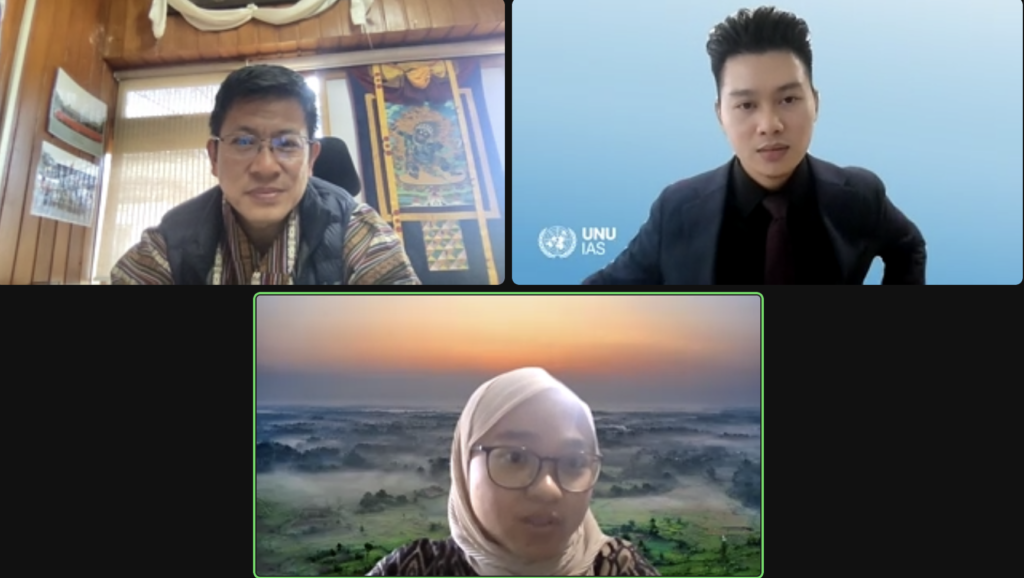 A keynote speech by Sonam Wangdi (Nature Conservation Division, Department of Forests and Park Services, Royal Government of Bhutan) on ‘Environmental Conservation and Net Zero Efforts in Bhutan’, highlighted the country’s focus on environmental conservation, one of the four pillars of Gross National Happiness. A reverence to nature among the population of 700,000 citizens plays a major role in shaping environmental conservation efforts, in addition to a constitutional mandate that 60% of the country’s geographical land be under forest cover, a target which has been exceeded. He explained that Bhutan continues to focus on sustainable forest management and conservation of biodiversity, as well as promoting low-carbon transport systems and clean, renewable energy.
A keynote speech by Sonam Wangdi (Nature Conservation Division, Department of Forests and Park Services, Royal Government of Bhutan) on ‘Environmental Conservation and Net Zero Efforts in Bhutan’, highlighted the country’s focus on environmental conservation, one of the four pillars of Gross National Happiness. A reverence to nature among the population of 700,000 citizens plays a major role in shaping environmental conservation efforts, in addition to a constitutional mandate that 60% of the country’s geographical land be under forest cover, a target which has been exceeded. He explained that Bhutan continues to focus on sustainable forest management and conservation of biodiversity, as well as promoting low-carbon transport systems and clean, renewable energy.
Throughout the programme, a series of leadership activities delivered by John Park (Visiting Research Fellow, UNU-IAS) and Shengru Li (Research Fellow and Academic Associate, UNU-IAS) took participants through leadership theories for sustainable development, education for sustainable development competencies, and discussions about leadership. These covered the unique characteristics of leadership for sustainable development, a skills model of leadership, and competencies needed for sustainable development projects. Philip Vaughter (Research Consultant, UNU-IAS) conducted an activity to identify differences between bosses and leaders, highlighting the attributes which make for good leaders.
A number of lectures delved deeper into implementation strategies, introducing the concept of stakeholder identification, outlining the benefits of stakeholder engagement (such as participatory initiatives), as well as engagement approaches and stakeholder collaboration models. A lecture on results-based project design and results-based management (RBM) by Jonghwi Park (Programme Head, UNU-IAS) took participants through the principles and approaches to managing projects using a results-based perspective. She highlighted the importance of ensuring activities contribute to the desired results, and utilising data and evidence of actual results to inform any decision-making on programme design.
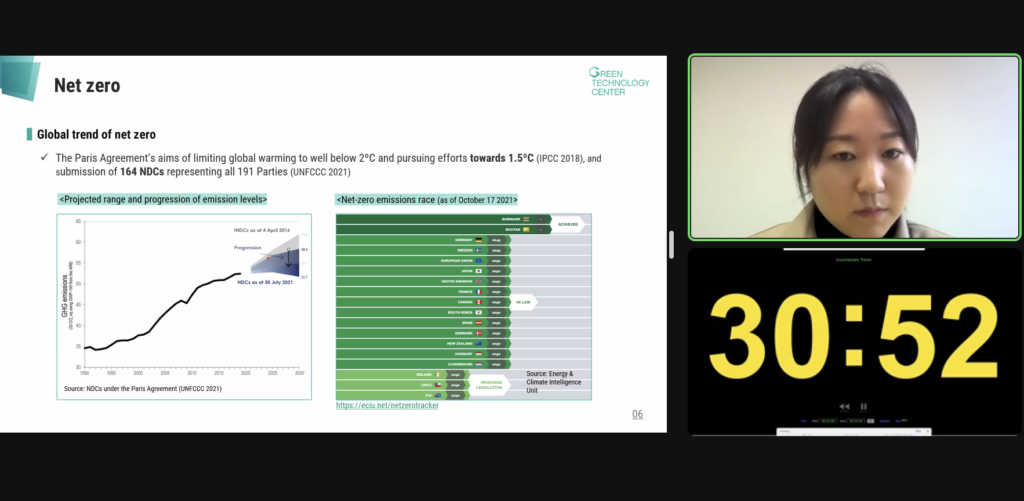 On the second day, Hanna Kang (Post-doctoral Researcher, Climate Technology Cooperation Division, Green Technology Centre Korea) presented on net zero governance, starting with an introduction to the net zero concept which seeks to reduce emissions (e.g. from industry, transport, agriculture) whilst increasing absorption capacity (e.g. from forestry, technological solutions, and carbon capture utilisation and storage), before an in-depth look at initiatives that Korea is taking on this front, including stakeholder engagement activities. Rywon Yang (Senior Researcher, Climate Technology Cooperation Division, Green Technology Centre Korea) discussed Korea’s efforts in achieving a carbon neutral society, including the milestones to date, such as the Framework Act on Carbon Neutrality and Green Growth in 2021 which introduced the reduction of greenhouse gas emissions and adaptation to climate change – as well as reduction targets – compared to the previous Act in 2009. Considering Korea’s experience, she stressed the importance of setting legally binding goal statements on carbon neutrality and GHG reduction targets, in addition to streamlining national and local level implementation schemes. Jihei Song (Senior Researcher, Center for International Development Cooperation, Korea Institute for International Economic Policy) presented on policy development, implementation, and review, focusing on the development of Korea’s Net Zero Policy, a central-led policy that cascades to regional/local policy which allows for coherence and clear responsibilities for stakeholders. She further provided examples from a number of Korean cities and their plans for implementation, explaining their strategies and actions which reflect on the regional and local features and capabilities.
On the second day, Hanna Kang (Post-doctoral Researcher, Climate Technology Cooperation Division, Green Technology Centre Korea) presented on net zero governance, starting with an introduction to the net zero concept which seeks to reduce emissions (e.g. from industry, transport, agriculture) whilst increasing absorption capacity (e.g. from forestry, technological solutions, and carbon capture utilisation and storage), before an in-depth look at initiatives that Korea is taking on this front, including stakeholder engagement activities. Rywon Yang (Senior Researcher, Climate Technology Cooperation Division, Green Technology Centre Korea) discussed Korea’s efforts in achieving a carbon neutral society, including the milestones to date, such as the Framework Act on Carbon Neutrality and Green Growth in 2021 which introduced the reduction of greenhouse gas emissions and adaptation to climate change – as well as reduction targets – compared to the previous Act in 2009. Considering Korea’s experience, she stressed the importance of setting legally binding goal statements on carbon neutrality and GHG reduction targets, in addition to streamlining national and local level implementation schemes. Jihei Song (Senior Researcher, Center for International Development Cooperation, Korea Institute for International Economic Policy) presented on policy development, implementation, and review, focusing on the development of Korea’s Net Zero Policy, a central-led policy that cascades to regional/local policy which allows for coherence and clear responsibilities for stakeholders. She further provided examples from a number of Korean cities and their plans for implementation, explaining their strategies and actions which reflect on the regional and local features and capabilities.
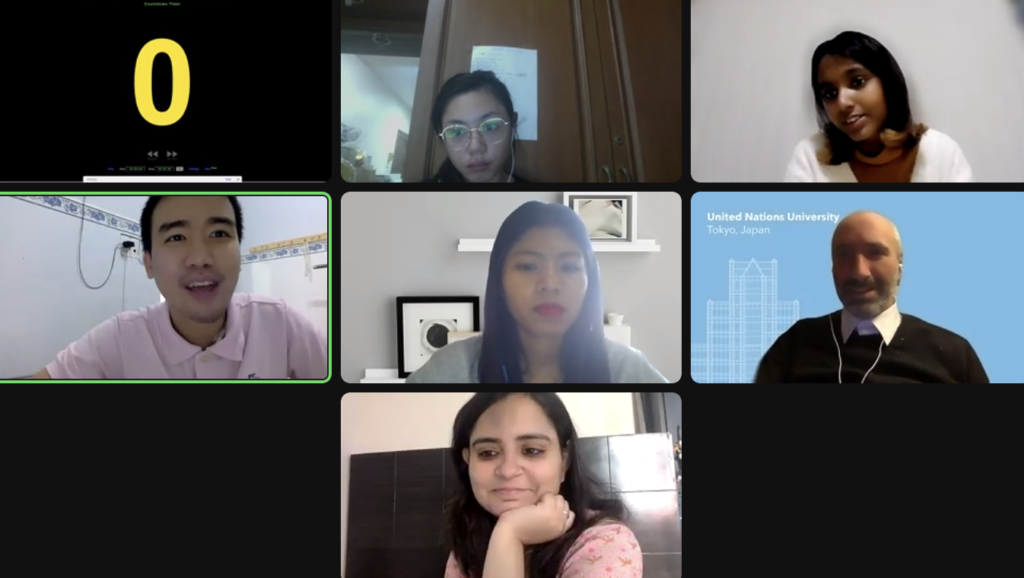 The third day began with a lecture by Tsuyoshi Fujita (Professor, University of Tokyo) on energy efficiency as a bridge to carbon neutrality, that covered the challenges for cities and metropolises and quantification models for sustainable urban planning. To achieve the social system transition, he discussed running short-run (demonstration) projects which are strategically connected to future ambitious targets, and how they could be designed for energy efficiency towards a carbon-neutral long-term future. Fumitake Takahashi (Associate Professor, Tokyo Institute of Technology) looked at energy efficiency in waste management, presenting a psychological approach on waste segregation. Starting with an overview of waste management in Japan and covering waste-to-power and waste-to-fuel technologies, this was followed by a case study on PET bottles and the potential of increasing pro-recycling behaviours to contribute to a more efficient waste recycling system. Philip Vaughter took participants through the principles of sustainable urban design, considering the impacts of zoning (mixed-use vs single use) and ‘third spaces’ in cities, and their roles in net zero solutions in urban settings. Explaining that the application of mixed-use zoning to high density areas can achieve low carbon cities, he highlighted examples from cities in Japan, which are often high in walkability and well-connected with multi-modal mass transit, resulting in lower greenhouse gas emissions. A lecture by Jorge Almazan (Associate Professor, Keio University) focused on Tokyo and its urban development and transformations over the decades, noting the distinction between ‘corporate Tokyo’ and an ‘emergent Tokyo’. The city of dense, low-rise neighbourhoods features landscapes of shared spaces comprising different modes of mobility; narrow streets are used by pedestrians, cyclists, and cars, making the city very liveable. He further spoke about patterns which could be utilised, such as yokocho alleyways, zakkyo buildings, and undertrack infils to enhance the positive character of cities to achieve urban sustainability goals.
The third day began with a lecture by Tsuyoshi Fujita (Professor, University of Tokyo) on energy efficiency as a bridge to carbon neutrality, that covered the challenges for cities and metropolises and quantification models for sustainable urban planning. To achieve the social system transition, he discussed running short-run (demonstration) projects which are strategically connected to future ambitious targets, and how they could be designed for energy efficiency towards a carbon-neutral long-term future. Fumitake Takahashi (Associate Professor, Tokyo Institute of Technology) looked at energy efficiency in waste management, presenting a psychological approach on waste segregation. Starting with an overview of waste management in Japan and covering waste-to-power and waste-to-fuel technologies, this was followed by a case study on PET bottles and the potential of increasing pro-recycling behaviours to contribute to a more efficient waste recycling system. Philip Vaughter took participants through the principles of sustainable urban design, considering the impacts of zoning (mixed-use vs single use) and ‘third spaces’ in cities, and their roles in net zero solutions in urban settings. Explaining that the application of mixed-use zoning to high density areas can achieve low carbon cities, he highlighted examples from cities in Japan, which are often high in walkability and well-connected with multi-modal mass transit, resulting in lower greenhouse gas emissions. A lecture by Jorge Almazan (Associate Professor, Keio University) focused on Tokyo and its urban development and transformations over the decades, noting the distinction between ‘corporate Tokyo’ and an ‘emergent Tokyo’. The city of dense, low-rise neighbourhoods features landscapes of shared spaces comprising different modes of mobility; narrow streets are used by pedestrians, cyclists, and cars, making the city very liveable. He further spoke about patterns which could be utilised, such as yokocho alleyways, zakkyo buildings, and undertrack infils to enhance the positive character of cities to achieve urban sustainability goals.
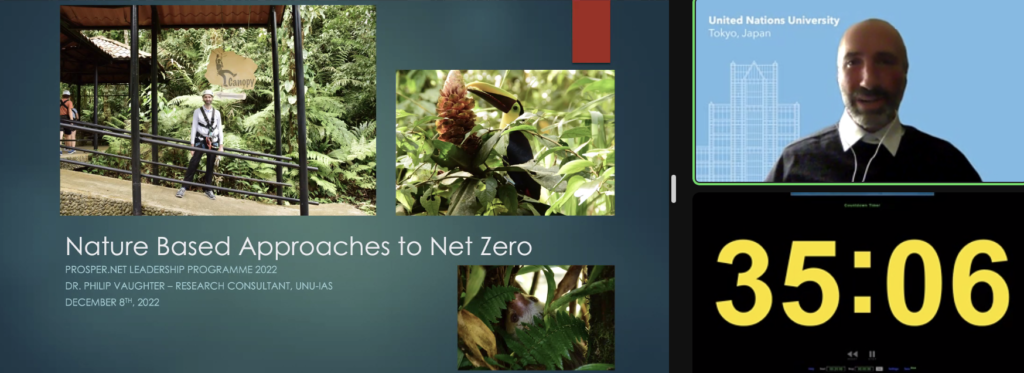 The last day of lectures started with a presentation from Philip Vaughter on nature-based solutions, covering actions that protect, sustainably manage, or restore natural ecosystems, often with other benefits that address societal challenges such as climate change, food and water security, and human health. He outlined the pivotal role nature-based solutions can play towards net zero, highlighting actions such as forest conservation and the REDD+ (Reducing Emissions from Deforestation and Forest Degradation) framework, which focuses on reducing emissions from deforestation and forest degradation, as well as the conservation and enhancement of forest carbon stocks. Rodrigo De Sousa (Implementation Manager, Osa Conservation) gave a presentation on reforestation and sustainable land use, highlighting the work by NGO Osa Conservation with their Ridge to Reef project, that works to restore agricultural landscapes within Costa Rica. Working with over 260 farmers, the project’s restoration efforts include planting and maintaining trees native to the subregions they work in, as well as the establishment of model farms, which include restoration, productivity, and farm diversification initiatives.
The last day of lectures started with a presentation from Philip Vaughter on nature-based solutions, covering actions that protect, sustainably manage, or restore natural ecosystems, often with other benefits that address societal challenges such as climate change, food and water security, and human health. He outlined the pivotal role nature-based solutions can play towards net zero, highlighting actions such as forest conservation and the REDD+ (Reducing Emissions from Deforestation and Forest Degradation) framework, which focuses on reducing emissions from deforestation and forest degradation, as well as the conservation and enhancement of forest carbon stocks. Rodrigo De Sousa (Implementation Manager, Osa Conservation) gave a presentation on reforestation and sustainable land use, highlighting the work by NGO Osa Conservation with their Ridge to Reef project, that works to restore agricultural landscapes within Costa Rica. Working with over 260 farmers, the project’s restoration efforts include planting and maintaining trees native to the subregions they work in, as well as the establishment of model farms, which include restoration, productivity, and farm diversification initiatives.
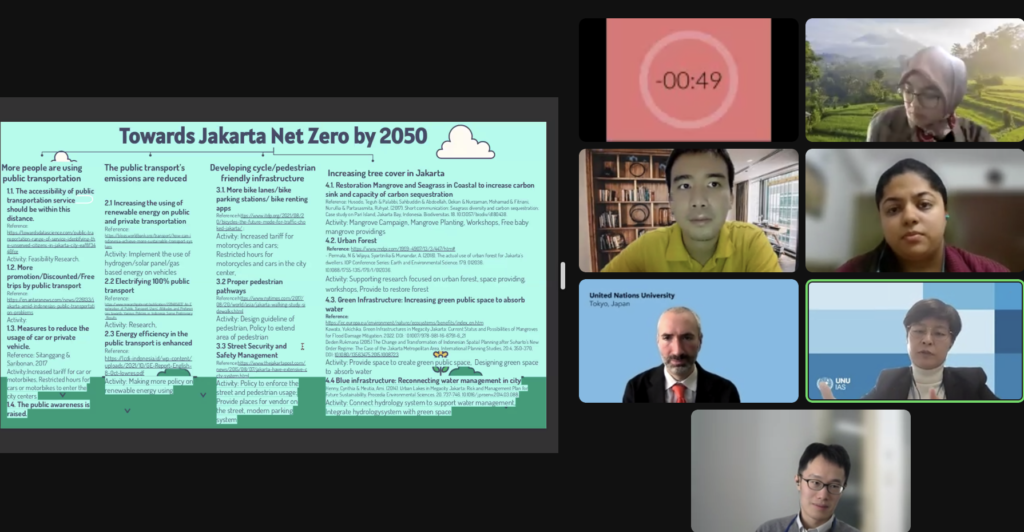 For the final group presentations, each group was tasked with designing a net-zero transition strategy that could be incorporated in a city or community, incorporating what they learned during the programme. Presentations focused on: (i) reducing GHG emissions in the city of Manila by focusing on urban design and the transport sector; (ii) tackling the issue of food waste in the city of Bandar Sunway, Malaysia using food-to-biogas technology, a digital monitoring system for waste management, and stakeholder dialogue and creating awareness; (iii) reforming the New Delhi transportation sector by strengthening public transport, implementing stringent emissions standards for vehicles, improving urban infrastructure, and the promotion of EVs; (iv) addressing air pollution in New Delhi through the introduction of e-cycling; and (v) transport sector management initiatives for the city of Jakarta, including the development of cycle-pedestrian friendly infrastructure and increasing tree cover in the city.
For the final group presentations, each group was tasked with designing a net-zero transition strategy that could be incorporated in a city or community, incorporating what they learned during the programme. Presentations focused on: (i) reducing GHG emissions in the city of Manila by focusing on urban design and the transport sector; (ii) tackling the issue of food waste in the city of Bandar Sunway, Malaysia using food-to-biogas technology, a digital monitoring system for waste management, and stakeholder dialogue and creating awareness; (iii) reforming the New Delhi transportation sector by strengthening public transport, implementing stringent emissions standards for vehicles, improving urban infrastructure, and the promotion of EVs; (iv) addressing air pollution in New Delhi through the introduction of e-cycling; and (v) transport sector management initiatives for the city of Jakarta, including the development of cycle-pedestrian friendly infrastructure and increasing tree cover in the city.
Each presentation demonstrated the key issues, implementation strategies, and expected outcomes through innovative approaches by the programme’s future climate leaders as they focus on the global transition towards net zero.
For further outcomes from the programme, view the event page here.
